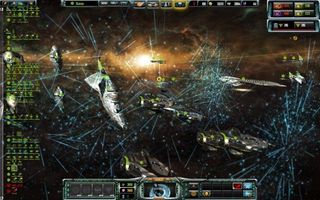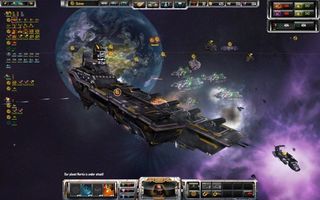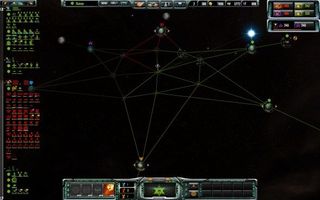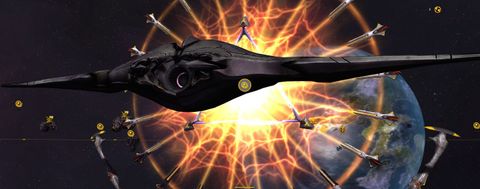Our Verdict
Bigger and more stable than ever, Sins of a Solar Empire: Rebellion will happily strip-mine your life of its free time.
PC Gamer's got your back
Too ruggedly professional to die, 2008 sleeper hit Sins of a Solar Empire has returned. Titled Rebellion, this third expansion comes in a new, expandalone format, and adds just about everything except actual rebellion. Silly developers!
Sins has aged well, partly because its only competitor, Sword of the Stars II, flopped harder than a snake slipping off a diving board, but also because its appeal is still intact. As you develop your empire, swinging from planet to planet, tumbling down the tech tree, stringing together fleets and levelling up your capital ships, the game simply gives you a bit too much to think about.
It's uncanny. As a beginner, you'll have your hands (and head) full developing trade routes and continuing the electric push of your culture across the solar system, perhaps with one eye on your prize fleet, making sure it's still winning some 20-minute pitched battle. But experts will be kept just as busy micromanaging the powers on individual ships, perhaps leaping home to oversee the construction of a Maginot Line-like array of turrets, before snapping up the diplomacy menu to offer a job, a ceasefire, a demand, then back to the fight.

Sins' sweet spot is that it always threatens to overwhelm, but rarely does. This isn't the riptide real-time strategy of StarCraft II. It's more sedate than that. But the game simply has so much going on, its every element rewarding not just attention but obsession, that you're able to sink into it like a hot bath. Want to fling armadas around as if they were plastic toys? You'll have a great time. Want to orchestrate your fleets like an interplanetary Rommel? You'll see the rewards instantly.
Which brings us to what Rebellion adds. Perhaps most notably, it still doesn't add a singleplayer campaign, leaving you to fool around either online or in the excellently robust skirmish mode. Which is fine. There's also a whole new suite of tutorials, which prepare you for everything – except how to deal with this much content.
Sins' three relatively asymmetrical races have been further rent into Rebel and Loyalist variants, each of which holds a new teasing selection of powerful abilities and a unique Titan. We'll get to those. Loyalist TEC, for example, are a turtle's dream, with one tech that increases experience gained fighting in their own space and another that lowers the cost of the horrible Novalith Cannon (which lets them slam-dunk nukes into distant gravity wells). Meanwhile, the nomadic Vasari Loyalists gain the power to summon NPC vagabonds and devour planets like so many Mars Bars.

There are new corvettes and capital ships for each faction, too, but the Titans are the stars of the show. Monstrously expensive and perfectly suited to a long-form game like Sins, it's likely the fiercest fighting these behemoths will see will be attacks by wary players on their sprawling dockyard before they're completed.
As with everything else in the game, however, they strike a thoughtful balance. Completing a Titan is by no means a 'win' button, but the automated report that another player has finished one still instils a gentle dread.
Outside of the lack of a singleplayer campaign, about the only criticism that could be levelled at Rebellion is that it's not much of a looker anymore. But you know what? When you jump some 50 ships on top of an enemy fleet, announcing your presence in a flutter of missiles and hot burps of laser fire, you just can't tear your eyes away.

Bigger and more stable than ever, Sins of a Solar Empire: Rebellion will happily strip-mine your life of its free time.
Hey folks, beloved mascot Coconut Monkey here representing the collective PC Gamer editorial team, who worked together to write this article! PC Gamer is the global authority on PC games—starting in 1993 with the magazine, and then in 2010 with this website you're currently reading. We have writers across the US, UK and Australia, who you can read about here.


